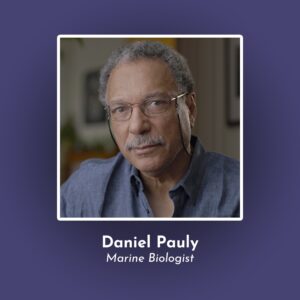
Ep 15 | Daniel Pauly
Daniel Pauly: “Peak Fish and Other Ocean Realities”
On this episode, we meet with Professor at the University of British Columbia and Founder of Sea Around Us, Dr. Daniel Pauly.
Dr. Pauly shares the role warming sea water plays in fish migration. How do warming temperatures affect water oxygen levels and fish behavior?
Dr. Pauly explains that the world has passed peak fish, and why contemporary metrics do not always paint a complete picture of our dire situation.
About Daniel Pauly
Dr. Daniel Pauly is a Killam Professor at the University of British Columbia, the Founder of the Sea Around Us, and author of more than a dozen books.
In French, we have a motto that says that a simple drawing is often better than a long explanation. Jean-Marc Jancovici Carbone 4 President
That’s very understandable because with left atmosphere thinking, one of the problems is that you see everything as a series of problems that must have solutions. Iain McGilchrist Neuroscientist and Philosopher
We can’t have hundreds and hundreds of real relationships that are healthy because that requires time and effort and full attention and awareness of being in real relationship and conversation with the other human. Nate Hagens Director of ISEOF
This is the crux of the whole problem. Individual parts of nature are more valuable than the biocomplexity of nature. Thomas Crowther Founder Restor
Show Notes & Links to Learn More
Download transcript00:45 – Daniel Pauly Info, Works, Projects, Vanishing Fish: Shifting Baselines and the Future of Global Fisheries
02:14 – Peak Oil Podcast
02:31 – Peak Fish Catch Worldwide in 1996
03:31 – Global fisheries statistics
04:07 – Understated declines because of more fisheries opening, making up for declining catches
04:38 – Declined fish catches of 1 million/metric tons per year
05:03 – Fisheries catch 80-90 million tons/year, but real catch of 130 million tons/year
05:28 – 15% declines in catch since 1996 in salt water fish
10:20 – Early humans migrated along coastlines
11:04 – When moving inland, humans wiped out most large mammals
12:05 – We then shifted to agriculture which shifted vegetation on the landscape
12:28 – Beginning of fossil energy use exploded fishing practices and accessibility
13:12 – Daniel Pauly paper on peak oil and peak fish (2013)
13:41 – Heavy subsidies enable fisheries in the high seas
14:22 – Smaller scale fisheries could produce the same amount of fish as large scale ones, and do it better
15:08 – Activism initiatives supporting small scale fisheries (WTO)
16:08 – The amount of time to recover fish stocks
16:48 – The US has been very successful at replenishing fishery stocks, mostly due to privilege
17:34 – Shifting Baselines
21:35 – 1950 as a baseline for fisheries
23:09 – Discount rates
23:49 – Climate change’s effects on the ocean + TGS Episode with Peter Ward
25:46 – Fish need to work to breathe the oxygen out of the water and they need it to digest
26:18 – Gills extract 80% of oxygen
27:10 – Ocean oxygen has dropped 2%
27:26 – As ocean temperature increase, fish need more oxygen
27:34 – Ocean temperature increasing
27:51 – Gill Oxygen Limitation Theory
28:39 – Homeostasis
29:05 – Temperature is 1-1.5 degrees Celsius warmer globally
29:33 – Fish populations have moved polewards
32:22 – Equator countries will be hit the hardest by these changes
32:48 – Salmon in California are gone
33:38 – Over forecast of fossil fuels remaining
33:42 – Bio-feedbacks are underestimated
34:10 – Pauly’s paper on changes mean temperature of the catch
37:28 – Map of how fish have migrated over the years
38:04 – Methane release in the tundra
38:53 – High temperature tolerant fish
43:02 – Trawling and other destructive fishing practices
43:22 – Marine protected areas
44:37 – Steven Magnuson Act
47:45 – Sea Around Us
47:56 – Rachel Carson The Silent Spring
49:33 – Small scale fisheries are ⅓ of all fisheries
53:24 – Fish farms
53:41 – Carnivorous fish do not reduce pressure on fisheries
54:49 – Colorant added to salmon







